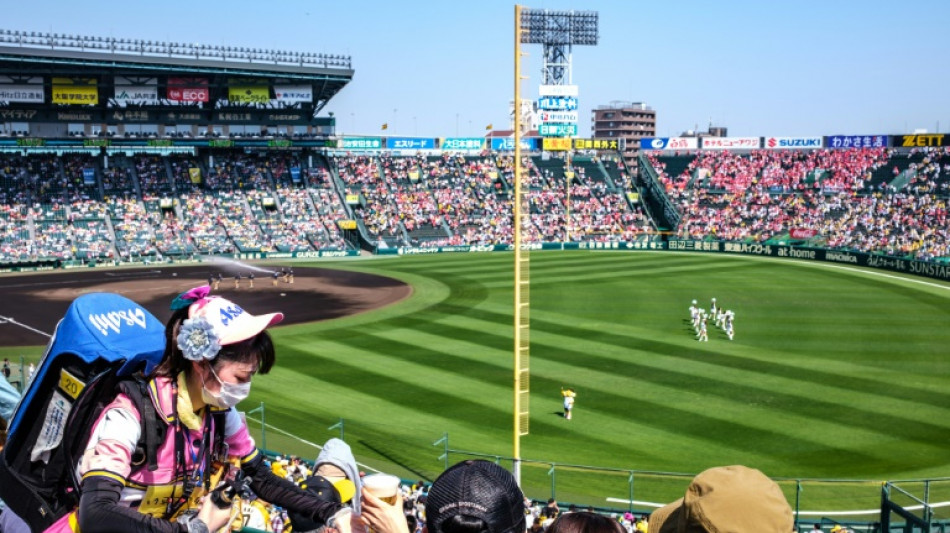

Japan's rowdiest baseball fans desperate to end pandemic silence
In a country of baseball fanatics, Hanshin Tigers supporters are known as Japan's rowdiest -- so they are aching to cut loose as a pandemic ban on cheering drags into a third season.
In pre-coronavirus times, the Tigers' Koshien Stadium near Osaka was a riot of noise and colour with fans shouting, singing and playing trumpets in fervent support of their team.
But since Covid they have been silenced and their voices replaced by recorded chants piped into the stands through loudspeakers after cheering was banned at Japanese sports stadiums to combat the virus.
Tigers supporters, who often outnumber home fans at away games and are easily recognisable in their weird and wonderful yellow and black outfits, say they are "praying" for the day when they can yell their full-throated support again.
"I think people will be so happy that they'll all get naked," 57-year-old lifelong Tigers fan Hideyuki Takashima told AFP.
The start of the new baseball season in March saw fans in the league allowed back in full numbers, after attendances had been limited to maintain social distancing.
But signs asking them to wear face masks and refrain from chanting, singing and talking in loud voices remain.
Some Tigers fans, like 59-year-old Hiroshi Umehara, say the cheers can "just slip out" after a drink or two, but others find different ways to release their pent-up emotions.
"I wait until I get home and then I let it out there, I sing in the bath," said 56-year-old Shigeyuki Morishita.
- 'Way of life' -
The Tigers have won the Japan Series title only once, but they enjoy massive support in Osaka, Japan's third-biggest city and known for its rough-and-ready humour and down-to-earth character.
When the team won the title in 1985, fans celebrated by jumping into Osaka's Dotonbori Canal.
Yuko Kawase, who attends games wearing a home-made kimono covered in the team's logo, says it is "a way of life".
"It's like you're sitting on the bench with them, competing alongside them," said the 47-year-old, who attends about 80 or 90 games a season and also travels to the team's pre-season training camps.
"Hanshin fans don't look at it as a sport or a pastime -- your life is Hanshin. No Tigers, no life."
The Tigers' lack of trophies over the years stands in stark contrast to Japan's most successful team, the Yomiuri Giants.
The Tokyo-based Giants have won the Japan Series 22 times and are considered their country's version of the New York Yankees for their unrivalled dominance and spending power.
Tigers fan Kawase says she refuses to attend regular season games at Yomiuri's Tokyo Dome stadium and cannot even bring herself to say the word "Giants", calling the team "G" or "that orange lot".
Another Tigers supporter, who gives his name as "Angel", says the rivalry between the Tigers and the Giants reflects the difference between Osaka and Tokyo -- the capital is perceived as more uptight.
"The Giants don't have such passionate fans," said Angel, dressed in full tiger costume complete with stripy face paint.
"They only support their team when they're doing well. They suddenly desert them when they're not doing well."
- 'Win or lose' -
At the moment, it is the Tigers who are most definitely not doing well.
They have made their worst-ever start to the season, losing 18 of their first 21 games.
Kimono-wearing Kawase says fans are quick to boo the players for poor performances, but she says those who do are "not true Hanshin supporters".
"If we win the rest of our games this season we'll win the title, that's how the fans console each other," she said.
"Whether we win or lose, if the Tigers are playing, we'll go and watch them."
No timetable has been set for the end of Japan's cheering ban, but the Tigers fans are largely resigned to it continuing for at least a few more months.
They long to sing the team's anthem "Rokko Oroshi" and release balloons into the sky after the seventh inning, a tradition that has also been put on ice since the pandemic.
Kawase says she can hardly wait to feel the "togetherness" in the stadium when the rules are finally lifted.
"When you have tens of thousands of people all expressing themselves and not having to worry about it, it will be an amazing atmosphere," she said.
T.Zangari--IM


